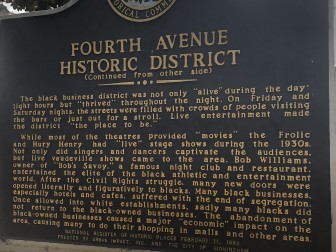Revitalization Planned for Historic Black Business District
During the days of segregation, African Americans in Birmingham were restricted on where they could shop, eat, and do business. The historic Fourth Avenue District downtown became the place for the growing African American business community to set up shop.
The community thrived with professional offices, barber shops, a bowling alley, motels, theaters and restaurants. Now there’s renewed focus on revitalizing the district.
Ivan Holloway, executive director of the nonprofit development group Urban Impact Inc., says the group wants to draw more tourists and residents to the area to sample the city’s black culture.
“If people live here, if people work here, then people visit here, and we have a robust economy,” Holloway says.
Thousands of people visit the nearby Birmingham Civil Rights Institute each year. But around it, there are empty storefronts and vacant lots. Holloway wants to fill those spaces with new shops, professional offices and restaurants.
To that end, Urban Impact is partnering with Main Street Alabama, an economic development group that revitalizes historic communities around the state. The groups met recently with property owners and city leaders to help map out plans for the district.
Holloway grew up in Birmingham. When he was young, his mother would take him to Fourth Avenue to get his haircut. He says back then, it was a vibrant place.
“You could walk down Fourth Avenue, and your mom tells you, ‘Well he’s a doctor. She’s a lawyer. She’s a doctor. He’s an engineer,’” Holloway says. “They owned their building and they owned their companies and they worked. That was important. It meant a lot.”
Nolanda Hatcher, 52, is an architect who also grew up visiting the area. Now she lives and works there, and she’d like for more professionals to do the same.
Hatcher redesigned the old Famous Theater Building, and she sees the area’s potential.
“All of downtown Birmingham is headed in a new direction, and the Fourth Avenue District is no different,” she says. “I think the difference is somebody else being able to see the potential and the opportunity down here, without a lens or racism.”
Eugene Jones says he wants to see the Fourth Avenue District come alive again.
He has been cutting hair at Talk of the Town barbershop for 40 years. He says development dollars seem to pour in to other parts of the city while his area struggles.
“It take money to do this. For some reason, it’s hard to get money into the black neighborhoods,” he says. “It’s been that way for the 70 years I’ve been on this earth.”
Carol Kirby McElderry, who runs Kirby Insurance Agency, Inc., agrees it will take resources to rebuild the district. The agency has been in the historic district since her father founded the company in 1963.
McElderry says the district needs a variety of businesses and professional services, and the black community plays a critical role in sustaining them.
“You have to have a consumer support base, and unfortunately as African Americans, we are probably the most guilty in terms of moving away from minority-owned businesses,” she says.
That trend started once segregation ended. Birmingham’s black residents were no longer confined to the Fourth Avenue District. They could eat, shop and do business anywhere in the city — and they did. But that hurt the historic black business district.
By the mid 1970s, many of the shops closed and the area was overrun with prostitutes and drug dealers.
Then-Mayor Richard Arrington made some improvements to the district, including new storefronts, a small amphitheater, and greenery. But redevelopment stalled.
Holloway says this latest effort has enough support to make it sustainable. When the district observes its centennial in 2022, he says he wants to see 40 new businesses and lots of new faces.
Hungary’s oldest library is fighting to save 100,000 books from a beetle infestation
Restoration workers are removing about 100,000 handbound books from their shelves and carefully placing them in crates, the start of a disinfection process that aims to kill the tiny beetles.
A military exercise drawing together 19 nations and 35,000 forces begins in Australia
The largest-ever war fighting drills in Australia is underway and expected to attract China's attention. Talisman Sabre began in 2005 as a joint exercise between the U.S. and Australia.
Trump marks anniversary of assassination attempt at the FIFA Club World Cup final
The president joined the players on the field after the match to present PSG players with their runner-up medals and hand Chelsea their championship trophy.
Wildfire destroys a historic Grand Canyon lodge and other structures
A park official said the visitor center, the gas station, a waste water treatment plant, an administrative building and some employee housing were among the 50 to 80 structures lost.
Jannik Sinner wins Wimbledon, Italy’s first singles champion
Italy's Jannik Sinner defeated defending champion Carlos Alcaraz to win his first Wimbledon title. Sinner is the first Italian to win the tournament.
Senate committee details failures by Secret Service in preventing Trump shooting
The Senate Homeland Security Committee said the Secret Service's "lack of structured communication was likely the greatest contributor to the failures" at the Pennsylvania rally last summer.









